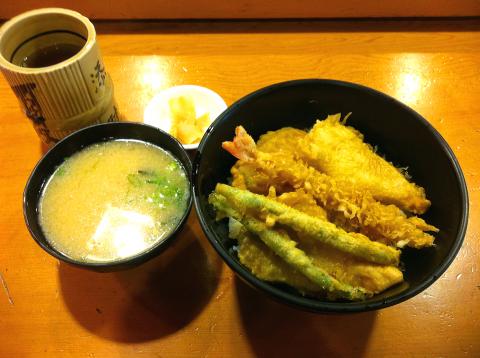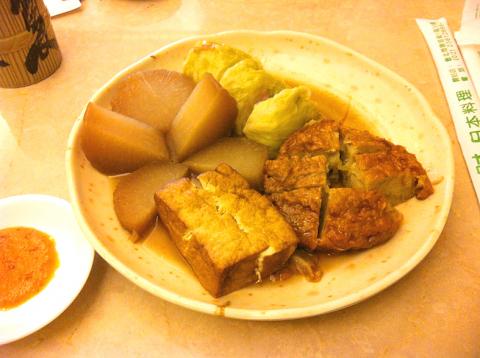Taipei teems with trendy Japanese restaurants, but thankfully there are also plenty of down-to-earth and reasonably priced places such as Tian Cai Refreshment Saloon (添財日本料理).
Pay no mind to the ill-chosen English name. Tian Cai, which has been around since 1968, serves standard Japanese cuisine with the typical Taiwanese touch. Its clean and tidy branch on Kaifeng Street (開封街) near Taipei Main Station offers a welcome respite from the flood of cheap food stalls and greasy lunch box joints in the area, not to mention the general griminess of the neighborhood.
Judging from numerous midday visits, the locale is a favorite among the area’s office workers and bank tellers, many of whom likely come for Tian Cai’s inexpensive lunch deals. The ten-don (天丼, in Mandarin, “tiandong,” NT$130), an assortment of fish, shrimp and vegetable tempura served on rice, hits the spot when it comes to deep-fried comfort. The gyudon (牛丼, in Mandarin, “niudong,” NT$130), or thinly sliced beef and fried onions served on top of rice, is a decent version of this Japanese standard. I also like the omurice (蛋包飯, in Mandarin, “danbaofan,” NT$130), tomato sauce fried rice wrapped inside an egg omelet, which is not as greasy as what you normally find in a food court. On the other hand, the salmon fried rice (鮭魚炒飯, NT$200), which the staff often suggest, is a tad too oily.

Photo: David Chen, Taipei Times
Another dish you’ll spot on everyone’s tables are big plates loaded with the restaurant’s specialty, kanto-ni (關東煮), more commonly known as oden (黑輪). Oden is an assortment of tidbits, such as large chunks of daikon radish, fish sausages, and tofu, boiled in a soy broth. The restaurant keeps a large boiling vat of this wintery food next to the sushi bar, and customers can go there to choose the items they want. Prices range from NT$30 to NT$180 per piece, and Tian Cai’s offerings beat convenience store oden any day. I enjoyed the boiled fishcake tempura (甜不辣) and the hearty pork meatball wrapped in cabbage, especially when dipped in the accompanying spicy miso sauce.
There’s a quaint, old-school charm to Tian Cai’s Kaifeng street branch. Sitting at the long wooden bar on one lunchtime visit, I watched the sushi chef, who looked like he was in his twenties, politely offer a toast to an elderly man, after he noticed the customer was dining — and drinking — alone.
The place doesn’t quite match the romantic image one might have of a wooden Japanese inn, but there are red lanterns hanging about, and the space is generally well-kept. The tables and chairs look like they’ve been around since the 1980s, but remain in good condition.

Photo: David Chen, Taipei Times
There’s no English menu, nor are there photos of the food on the well-worn laminated menus (which also look like they’re leftovers from the 1980s), but ordering shouldn’t be much of a problem for non-Mandarin speakers. The staff, composed of mostly elderly ladies wearing headscarves, matching pink shirts and flip-flops, are friendly, though they may seem a bit hurried during the lunch rush.
Tian Cai’s offers an extensive menu suited to dinner parties (regular customers can stash their bottles of scotch in a rack at the back of the restaurant). Fresh sushi and nigiri rolls range from NT$90 for a plate of sushi inari (稻荷壽司, tofu skin sushi) to NT$300 for a mixed plate (綜合握壽司). Japanese-style barbecue dishes start from NT$150, fresh seafood salads run from NT$180 to NT$400 and the dozen or so meat and vegetable stir-fry dishes average NT$200. Judging from the mixed nigiri plate, I found the fish to be fresh and of good quality.
The Kaifeng branch has a second floor, which is quieter during lunch time and is equipped with several private Japanese style rooms, partitioned by sliding wooden doors. Tian Cai’s original branch is located in nearby Ximending (西門盯) at 6, Ln 16, Wuchang St, Zhongzheng District, Taipei City (台北市中正區武昌街一段16巷6號).

That US assistance was a model for Taiwan’s spectacular development success was early recognized by policymakers and analysts. In a report to the US Congress for the fiscal year 1962, former President John F. Kennedy noted Taiwan’s “rapid economic growth,” was “producing a substantial net gain in living.” Kennedy had a stake in Taiwan’s achievements and the US’ official development assistance (ODA) in general: In September 1961, his entreaty to make the 1960s a “decade of development,” and an accompanying proposal for dedicated legislation to this end, had been formalized by congressional passage of the Foreign Assistance Act. Two

Despite the intense sunshine, we were hardly breaking a sweat as we cruised along the flat, dedicated bike lane, well protected from the heat by a canopy of trees. The electric assist on the bikes likely made a difference, too. Far removed from the bustle and noise of the Taichung traffic, we admired the serene rural scenery, making our way over rivers, alongside rice paddies and through pear orchards. Our route for the day covered two bike paths that connect in Fengyuan District (豐原) and are best done together. The Hou-Feng Bike Path (后豐鐵馬道) runs southward from Houli District (后里) while the

March 31 to April 6 On May 13, 1950, National Taiwan University Hospital otolaryngologist Su You-peng (蘇友鵬) was summoned to the director’s office. He thought someone had complained about him practicing the violin at night, but when he entered the room, he knew something was terribly wrong. He saw several burly men who appeared to be government secret agents, and three other resident doctors: internist Hsu Chiang (許強), dermatologist Hu Pao-chen (胡寶珍) and ophthalmologist Hu Hsin-lin (胡鑫麟). They were handcuffed, herded onto two jeeps and taken to the Secrecy Bureau (保密局) for questioning. Su was still in his doctor’s robes at

Mirror mirror on the wall, what’s the fairest Disney live-action remake of them all? Wait, mirror. Hold on a second. Maybe choosing from the likes of Alice in Wonderland (2010), Mulan (2020) and The Lion King (2019) isn’t such a good idea. Mirror, on second thought, what’s on Netflix? Even the most devoted fans would have to acknowledge that these have not been the most illustrious illustrations of Disney magic. At their best (Pete’s Dragon? Cinderella?) they breathe life into old classics that could use a little updating. At their worst, well, blue Will Smith. Given the rapacious rate of remakes in modern